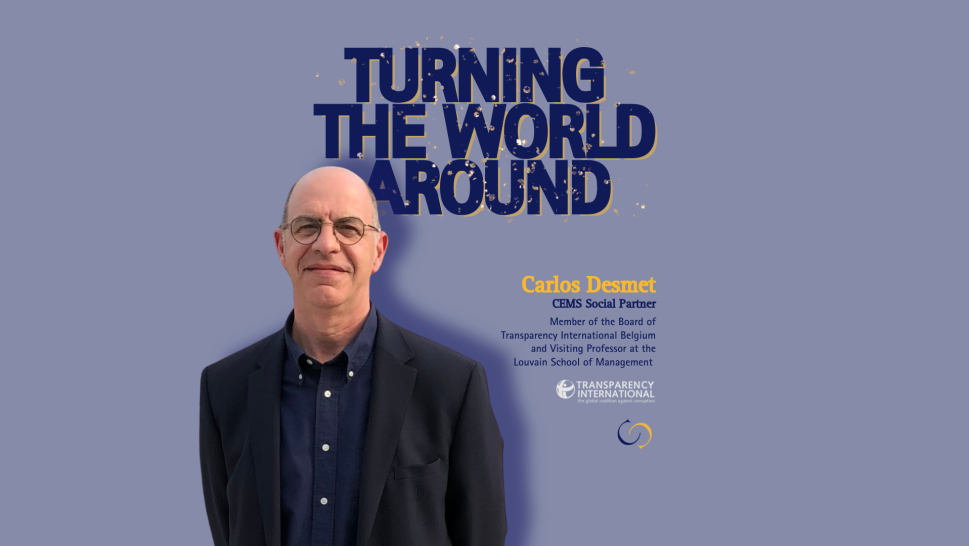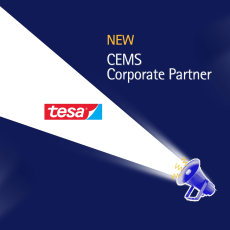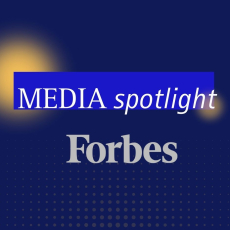BIO
Carlos Desmet: Board member
Organization: Transparency International Belgium
Other experience: Visiting professor at IESEG, KU Leuven, Louvain School of Management, EM Lyon
Business Compliance Officer Shell International
WHAT IS TRANSPARENCY INTERNATIONAL?
We are an NGO founded in 1993 by former leaders at the World Bank. We’re headquartered in Germany, and we are working with more than 100 countries world-wide to tackle corruption. We operate via national chapters in each country because sovereign states have their different challenges and processes, and our work brings us close to both private and public sectors to improve legislation for transparency and support the implementation of sanctions in cases of corruption. As an organisation, we’re heavily involved in country-specific research to help authorities synchronise their efforts and new policies. One of our key outputs is an annual Corruptions Perceptions Index which effectively ranks countries on the basis of experts and business leaders. Another part of our remit is to organise regular events to share good practice with stakeholders on topics like transparency, whistleblowing… And we really encourage people and organisations to engage with us and to use our research to see where their territories rank and identify areas for improvement in the fight against corruption.
YOU INVITE PEOPLE AND ORGANISATIONS TO ENGAGE, BUT DO YOU EVER EXPERIENCE PUSHBACK?
I’d say that most people and businesses understand from experience that corruption simply isn’t good for economies. It removes money and resources from where they are needed and where they can have positive impact. Corruption doesn’t service people and institutions at scale and over time, and my experience is that most organisations and leaders understand this. That said, just how willing individual organisations are to engage and follow the agenda that we share will vary on a case-by-case basis. Internally, we do our utmost to connect and drive engagement. Most of us within the organisation come from business or the public service, or from academic backgrounds and we aim to leverage our networks as much as possible to extend reach. We also work with students and the younger generation to explore ethical dilemmas and why integrity is so important in business and public affairs. Our great hope is that the next generation will buy into the agenda, and exert their influence over existing leaders and incumbents to stop corrupt practices where they live or study.
WHAT KIND OF IMPACT ARE YOU SEEING?
Transparency International has been very instrumental in bringing the theme of corruption to the table at the highest levels of influence and international collaboration. Since 2008, corruption has been a topic under scrutiny at G7 and G20 meetings and conferences. Meanwhile anti-corruption objectives have been integrated into UN Development Goals which are a measure of the long-term success of humanity.
In the 1990s, no one was really talking about corruption. It was kind of swept under the table: sure, a few % might be shaved from GDPs here and there, but that was felt by some as being part of doing business. Since then we’ve been an active force in driving a new narrative around corruption and how it really impacts economies, health and sustainability. In the last few decades, Transparency International has been super vocal about bringing these issues to the agenda, bringing in new tools to drive legislation across bodies like the UN and the OECD – tools and legislation that then percolate down to countries. So we’ve been a driving force in raising awareness and generating positive outcomes.
YOU COLLABORATE WITH CEMS, AMONG OTHER ORGANISATIONS. WHAT KIND OF WORK DO YOU WITH US?
The CEMS connection arose from my work at Louvain School of Management which is a CEMS school. We initiated our collaboration by working on projects with students in Belgium, specifically looking at how to facilitate whistleblowing on corruption within organisations; that and also analysing integrity systems that operate within different political parties in the country. In both instances, students were able to go in and explore these entities, taking a factual look at what they were doing and making disclosures and reports. We leverage our personal and professional networks to gain access to organisations and while it’s usually very effective, it’s true that one of the Belgian parties refused to collaborate with us; which is in itself a finding, right?
These kinds of collaborations are a win-win for us, for organisations that take part and for the students themselves.
HOW ARE THEY WIN-WIN?
Well, for us as an NGO, we do work with our contacts and with volunteers, but we sometimes lack the expertise in analysis and research techniques. When we work with CEMSies we are sure to give them access and a good operational framework for the analyses they do, but the findings and the suggestions for improvement in processes and systems come from them, which is great. CEMSies provide highly valuable research information that informs a lot of the work that we do in that area.
As for the organisations that agree to work with us, it’s important to note that none of this is a shaming exercise, quite the opposite. It’s about helping them to build transparency and solid practices. In general, what we find is the organisations are very receptive to suggestions from the students and they enjoy working with us too. The collaboration engenders discussions where different players can exchange good practices and ideas.
WHAT ABOUT THE STUDENTS? WHAT DO THEY GET OUT OF IT?
CEMS students get to dive into a topic that is generally very unfamiliar to them. They are developing a project but in a field that is new – and not something that is necessarily part of the curriculum. They also get to work with people who are passionate about the work they are doing. This is very different from working on a marketing project or a start-up – this is about value, integrity and sustainability which are values and concepts that are closer to younger generations.
I’d say another benefit for students is that they get to experience diverse organisations, private and public, from the inside. In their business lives, if they go into consulting or work in B2B contexts, say, they will be working with external stakeholders and clients, so it’s a valuable and interesting learning experience, seeing how different organisations function inside.
They also get exposure to a real diversity of different leaders and decision-makers who volunteer to work for Transparency International or who choose to collaborate with us – legal directors, CMOs, brand directors and others. They get to see professional people in a totally different light – focusing on issues that they feel passionate about. And of course, these are issues that are only going to become more acute as we go forward. Anti-corruption and transparency imperatives are increasingly translated into legislation across so many different areas of work, from human rights to climate change and beyond. Students who work with us are getting first-hand and hands-on experience of ideas and issues that are about to become new laws.
WORKING WITH THE NEXT GENERATION IS A WAY OF HEDGING AGAINST FUTURE THREATS IN A WAY, DO YOU AGREE?
Well, this is the future generation of leaders. They are the ones that will be leading business and society tomorrow. I think it’s critically important to impress the purpose and value of integrity on the minds of future leaders, yes.
But it’s also so important for incumbent leaders to have access to the skills and knowledge and perspectives that young people bring. We’ve had CEMSies introduce AI tools and chatbots into data-capturing projects that have just added exponential value to the quality of the information we capture and the solutions we can devise. It’s so important to be connected to that and to be able to leverage their capabilities and their passion to generate new ideas.
What we’ve found at Transparency International is that students from CEMS are incredibly passionate and enthusiastic about working with us. I was afraid we’d lose out to other kinds of organisations or projects but in fact, CEMSies are super interested in the work that we do and they are fascinated by the different ways that corruption can manifest, depending on country and culture. Working teams find it eye-opening to see how corrupt practices can work their way through organisations, institutions, systems and processes and out into the wider economy where they pervade and impair things like education, health and wellbeing – daily life. It’s an important and valuable learning for them.
YOU WORK ON THE FRONTLINE IN THE FIGHT AGAINST CORRUPTION. HOW OPTIMISTIC ARE YOU ABOUT WINNING THIS WAR?
It’s hard to see anyone ever truly winning the war against corruption – sadly, I think it’s part of human nature to want and take more than your fair share at times. That said, I hope that with new technologies and greater transparency we are going to live in a world more people (especially critical decision-makers) will have to be more accountable; a world in which it is simply harder and more risky to engage in corrupt activities.
In that sense I am cautiously optimistic. I do think that innovation and the democratisation of technology will make it more difficult to behave in unscrupulous or dishonest ways.
And it’s wonderful to be part of this work – to have a role in bringing about some kind of positive change and impact. It is a hugely enriching experience; one that I believe that the students we work with also find uniquely enlightening and rewarding.




